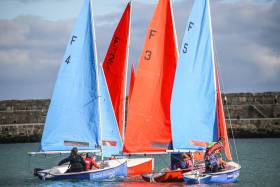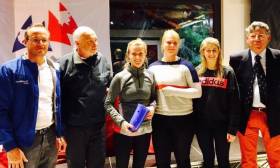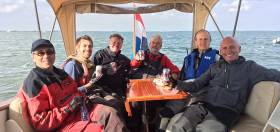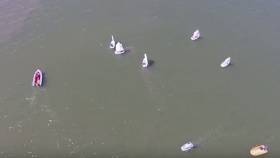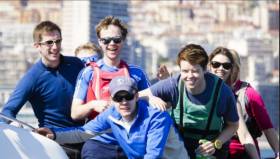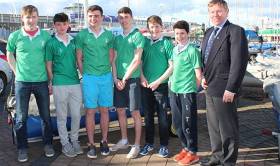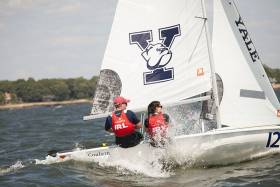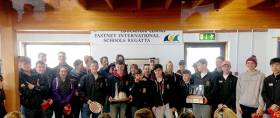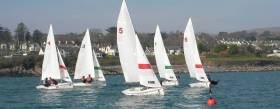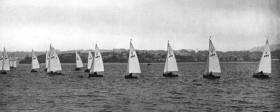Displaying items by tag: Team Racing
Firefly Dinghy Practice At Dun Laoghaire Ahead of Schools Team Racing Competition
Although the Leinster Schools Team Racing Championships may have been postponed at the weekend, it did not stop Dublin's Saint Andrews College from putting in a busy practice session in the Royal St. George Yacht Club Fireflies dinghies on Saturday afternoon.
The youth event is rescheduled for March 24th at the Royal St. George Yacht Club.
Royal Cork Keelboat Team Third In Venice 2K
#RCYC -The Royal Cork Yacht Club was represented this weekend at the Venice leg of the international 2K team racing circuit, hosted by the Compagnia della Vela di Venezia.
The mixed Cork crew, who enjoyed a strong finish in Anzio this summer, placed behind Britain’s Serpentine Racing and the winning Dutch-Italian contingent from the Yacht Club Costal Olanda, but ahead of the home team at Compagnia della Vela di Venezia.
The event, taking place from the 4th to the 6th of November, had 11 teams from Italy, Germany, The Netherlands, Britain, Ireland and Sweden competing in generally very light wind conditions. Unfortunately the final day of racing was cut short due to light winds and the results were awarded based on the round robin standings. The RCYC team were beaten by Britain’s Serpentine Racing and the winning Dutch-Italian contingent, known as Yacht Club Costa Olanda.
The team consisting of Fred Cudmore, Lisa Tait, Philip O'Leary, Sonia Minihane, George Kingston, Emma Geary, Sean Cotter and Sarah O'Leary finished in third place.
Royal St. George Dragons Win Cannonball Team Race Event at Royal Netherlands Yacht Club
The 'George Dragon Team claimed victory yesterday at the International Dragon Team Racing Event with race wins in the final against the Dutch and British teams from Royal Netherlands Yacht Club and Royal Thames YC.
The Royal St. George Team with Martin Byrne, Tim Pearson & Peter Bowring (helms) and John O'Connor, Marcus Pearson and Paul Maguire (crew) were tied with the Dutch and British teams going into the finals. However a last minute "photo finish" on the line gave the Irish a 1,3,6 winning score against the Royal Thames Team. The 'George Team won all their races today.
The annual event was hosted this year by the Royal Netherlands Yacht Club in Amsterdam, Holland.
Eleven teams of four sailors each took part in the IODAI–organised Optimist event on Friday 1st July at Malahide Yacht Club. Royal Cork Yacht Club and Monkstown Bay Sailing Club were well represented with five teams. The sailors completed 25 races in the group stages in very changeable but warm four knots to 30 knots, bright sunshine to heavy rain.
After two round robin flights, RCYC Pumas, Jaguars and Panthers teams were eliminated with MBSC Panthers being particularly unlucky, losing on count-back to a Royal St George team.
In the semi-final, RCYC Leopards were pitted against RCYC Cheetahs, ensuring one Cork team made it through to the final. The former won through and met the RStGYC counterparts who sailed well to even up the best of 5 series 1/1. In the third race, RCYC won narrowly in quite squally conditions but in the fourth race, with much less wind, Royal Cork proved quicker and comfortably won.
The Leopards, captained by Harry Twomey, with Diego and Alexandra Peletiero and Michael Crosbie, successfully defended the V-P trophy they won last year.
Royal Cork Yacht Club Second in 2K Team Racing Anzio
Over 3 days and no less than 42 races it was all down to the last match between the Dutch and their great rivals from Royal Cork. It was one of those starts that one wants to forget, but the Dutch clearly down, gambled on banging the corners to great effect. Back in the action at the windward mark the four boats were all within a boat length then it all started to unravel for Cork.
2K Team Racing is two on two team racing, in keelboats, without spinnakers.
Twin penalties for Smit (NED) and Kingston(IRL) saw the game balanced. then Cudmore(IRL) collected a penalty for tacking too close... the Dutch are in the lead... a final Irish penalty and it is all over...as the Dutch move into their tried and tested tight defence mode for the final run to the finish.
Host team Rome had had a hard regatta, losing to a rookie British team from the Royal Thames and to the young Italians from 3CV sailing as Banana 2....but the final honours were to go to them as then outplayed the Dutch to the closest of finishes in the final match....but all too late for the podium.
1st Dutch Match and Team Race Association (NED)
2nd Royal Cork Yacht Club (IRL)
3rd Royal Thames Yacht Club (GBR)
The 2K Tour now moves to another Italian Yachting paradise in Gaeta.
The Rome 2K was hosted by the Platu 25 Class and the Reale Circolo Canottiere Tevere Remo at the club's Anzio base.
The Royal St. George Yacht Club hosted the Leinster Schools Team Racing Championships in Dun Laoghaire Harbour last Tuesday. In glorious sunshine 8 teams completed 31 races to provide a result.
The Round Robin was tightly fought, with a 3 way tie between Loreto St. Stephens Green, Loreto Dalkey and St. Conleths, with Loreto St. Stephens Green coming out on top after a count back on points to break the tie.
In the finals it was Gonzaga versus Kilkenny and this went to the wire, with both teams having a win each. Now we were down to a nail biting 3rd race in which Gonzaga took the spoils. This was the second time running that Gonzaga have won the Leinster Schools Trophy. Commiserations to Kilkenny who gave Gonzaga quite a challenge.
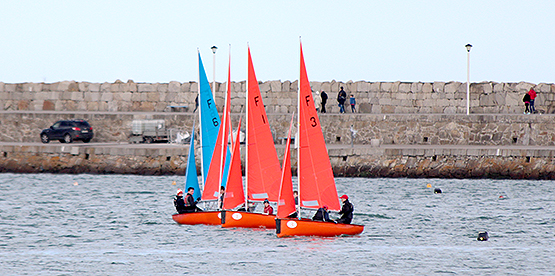
Leinster Schools Team Racing action at Dun Laoghaire
The top four teams qualify for the Irish Schools Team Racing Championships which will be hosted at the F.O.M.E.C. sailing centre in Schull on the 9th & 10th of April.
Adam Hyland (R.S.G.Y.C.) was the Race Officer and did an excellent job of completing the event, with a number of wind shifts throughout the day. Ailbe Millerick was the Chief Umpire and was assisted by Dave Sheahan.
Thank you to everyone who assisted in the organising and running of the event.
All the competitors deserve acknowledgement for the lovely manner in which they conducted themselves both on and off the water throughout the event.
The final results were as follows:
1st Gonzaga College
2nd Kilkenny
3rd Loreto St. Stephens Green (Tie Break 20 Points)
4th Loreto Dalkey (Tie Break 21 Points)
5th St. Conleths (Tie Break 22 Points)
6th St. Andrews 1
7th Belvedere College
8th St. Andrews 2
Dublin University Sailing Club Prepare for Collegiate Cup
Dublin University Sailing Club (DUSC) team will represent Ireland this summer at the Laser Performance Collegiate Cup (LPCC), an international team racing events to be held in Lake Garda, Italy. The event, hosted in 2015 by Yale Corinthian Yacht Club in Connecticut and won by the USA Women’s team, attracts college sailors from all around the globe and is raced in Z420 dinghies. Last year’s competition saw eight teams from seven countries compete, including representation from Oman and Japan.
Last year’s Irish team contained four Trinity sailors, one UCD sailor and one sailor from UCC. 2016 will see a full team of six sailors and two subs from Trinity representing Ireland.
Those who will travel to Lake Garda are 2012 London Olympian Scott Flanigan, Lucy Bolger, Dan Gill, Lindsey Watters, Mark Bolger, Maeve Lavelle, Dan O’Beirne, and Charlotte Bowen.
The event takes place from 23-27th August.
Dublin University Sailing Club, more commonly known as Trinity Sailing, is the largest student sailing club in Ireland with over 200 active members, 75 of whom compete regularly.
The International Schools Team Racing Championships sailed in Schull, West Cork at the weekend was a huge success, with the event being the first time this number of schools from the United States, England and Ireland had competed together in Team Racing.
15 teams sailed in ideal conditions; winter switched off and summer switched on.
The event was tightly fought for between Schull Sharks and Presentation Brothers Cork from Munster and Tabor Academy and Cape Cod Academy from the United States, all taking races from each other.
The final outcome was not known until the second last race, when Cape Cod Academy lost to Tonbridge college from the UK allowing PBC through as the overall winners.
1st PBC (Ireland)
2nd Cape Cod (USA)
3rd Tabor Academy (USA)
4th Schull Sharks (Ireland)
5th International (Ireland & USA)
6th Tonbridge college (England)
USA Crews Line Up for Inaugural International Schools Team Racing Championships in Schull
The inaugural International Schools Team Racing Championships will take place in Schull, West Cork from the 18th –20th March.
16 teams are entered, with Tabor Academy and Cape Cod Academy sending four teams from the USA arriving on the 16th, in time to take part in the Schull St Patricks Day parade with the Schull teams.
The international event has developed from Schull Sailing Teams traveling every two years since 2007 to visit US schools in the New England area, hopefully this will be a biennial event.
Four teams are coming from the UK, including Sevenoaks, Tonbridge, James Alexander Gordon and Burford schools.
The American schools are doing home stay with the Schull sailors.
Eight teams are entered from Ireland, mainly from Munster with one team from the RstGYC.
Firefly Dinghy Celebrates 70th Birthday
The dinghy synonmous with team racing in Ireland (and also early Olympic Games endeavours) celebrates an important birthday this year and the UK class is making a special effort to push the boat out. Designed in 1938 by Uffa Fox, as a one design boat suitable for team racing, the 2016 season marks the 70th Anniversary of Firefly Class; the first boats came off the production line at Fairey Marine, Hamble, in 1946. It was originally requested by Oxford and Cambridge Universities, requiring a dinghy similar to the National 12, but more suitable for team racing.
The design was completed in 1939 just prior to hostilities that would put back any ideas of production for more than six years. After the War, the Fairey Aviation Company had the idea of manufacturing a dinghy using the principles that constructed so many wooden Mosquito aircraft fuselages during the war, with diagonal laminates formed on a mould and cured by electrically heated bands holding the laminate in position.
SELECTED FOR THE 1948 OLYMPIC GAMES
As the 1948 Olympics in Britain approached, there were very few dinghies available in numbers, but the Firefly could be built quickly and in volume, so was selected as the single handed sailing dinghy for the Games.
Throughout the years, the class has been popular with many Schools and Universities, both in the UK and overseas, where it is sailed in team racing events. Many students have experienced their first dinghy racing in a fleet of Fireflies.
Some of the most famous names in sailing have previously raced Fireflies, including Paul Elvstrom, Bruce Banks, Richard Creagh Osborne and Jack Holt As well as current and six times World Match Racing champion Ian Williams.
NOW ONE OF THE MOST POPULAR BOATS
With more than 4250 boats built (650 built by Rondar Raceboats) the Firefly is one of the UK’s most popular and successful classes. It has now also been sold successfully overseas with fleets in the USA and Canada.
Many have preconceptions of what Firefly you would need to win the Nationals, but history has proven that the original wooden hulls and GRP hulls from every era all have a chance of winning; there are no inequalities in hull performance, unlike some classes. And you can sail at whatever level you choose – no maintenance or classic restored varnished hulls.
FLEET AND TEAM RACING
The Firefly is well respected as the ideal dinghy for team racing, offering good equal performance, great manoeuvrability and capable of being sailed in all weather conditions; it's always a team racing contender in the Endeavour Trophy, finishing 4th last year.
Team racing takes place at University Sailing Clubs, numerous schools and associations up and down the country each weekend.
During 2015, the ISAF World Team Racing Championships was held in the UK with many overseas teams participating. The final, held in a fleet of new boats supplied by Rondar, was won by a team from the USA!
The UK Class Association also organise a programme of fleet racing each year with Open events, Regattas and a National Championship.
The 2016 National Championships will be held at this year at Tenby, 6-12 August and we are hoping for 100 boats!
To celebrate this historic milestone the class and suppliers have come together to prize draw a brand new complete boat as a prize. It will require entrants to “beg, steal or borrow” a boat and compete in any of the nominated events or qualifying via club races this season, to secure a ticket in the prize draw for a brand new Rondar boat. The more race entries equals more prize draw chances. Conditions apply so please get details of how to enter from the UK Firefly website: www.fireflyclass.co.uk


























